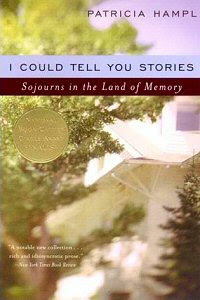 The following post by Danielle Trussoni kicks off In Retrospect'slook at Patricia Hampl's 1999 NBCC finalist, “I Could Tell You Stories.” This weekend, Trussoni also reviewed Hampl's latest book, “The Florist's Daughter,” in The New York Times Book Review.
The following post by Danielle Trussoni kicks off In Retrospect'slook at Patricia Hampl's 1999 NBCC finalist, “I Could Tell You Stories.” This weekend, Trussoni also reviewed Hampl's latest book, “The Florist's Daughter,” in The New York Times Book Review.
For a quick tutorial in stereotypes about Midwesterners, take a look at the Coen brothers' film Fargo.In it, you will see that Midwesterners are pleasant and patriotic and plump. You will understand that we are wholesome, hardworking folks with oversized cars and undersized vocabularies who wear white tennis shoes to church. We love all-you-can-eat buffets. Our houses are clean. (I'll never forget a story that Francine Prose told while visiting the Iowa Writers Workshop in 2001 about her Iowan landlady, who suggested that she clean the bathroom tiles with a toothbrush. Being native to the Midwest, I was mortified. At the same time, I thought: There's no place like (a clean) home! ) Of course, Fargo also reminds us of the Midwestern tendency toward violence. Ed Gein, whose career inspired the moviePsycho, was born in my hometown of La Crosse, WI. Jeffery Dahmer, murderer of at least seventeen men, was from Milwaukee. The list goes on and on. Everyplace has a downside. Ours happens to be serial murder. And Jello salad.
I was reminded of another Midwestern stereotype this summer when I mentioned to a writer I know that I'd been reading all of the memoirs of the Midwestern writer Patricia Hampl, NBCC finalist for “I Could Tell You Stories,” five memoirs in total. This person knew Hampl personally, and informed me that Hampl was “a talented writer but also very nice.” Here was another classic Midwestern descriptive: Midwesterners are nice. We say please and thank you; we don't talk politics at the dinner table; we shovel your car out of six feet of snow when you get stuck. Then, we go home, eat some goulash and stick pins in our voodoo dolls.
Whether Patricia Hampl is a nice person or not, I can't say, but her work certainly shatters the stereotypes mentioned above. There is nothing polite or resigned about her vision of the world. Her work is fretful, lyric and plangent. Her memoirs combine sharp literary analysis with an uncanny ability to use her own life as a vehicle for cultural critique.
Hampl's memoirs, so often about people and places outside the Midwest, usually double back to St. Paul, Minnesota, where she was born and continues to live. Her descriptions of the Midwestern landscape are lovely. Take this passage in I Could Tell You Stories:
“Beyond the bus the sky, instead of becoming paler with the dawn, drew itself out of a black line along the Mississippi into an alarming red flare. It was very beautiful. The old caution—Red sky in the morning, sailor take warning—darted through my mind and fell away. Remember this, I remember telling myself, hang on to this. I could feel it all skittering away, whatever conjunction of beauty and improbability I had stumbled upon.”
Although much of her work revolves around her literary and artistic heroes, Hampl's sketches of the people close to her (the ex-boyfriend who went to jail for refusing to go to Vietnam; her florist father and librarian mother; her Czech grandmother) are to my mind her most powerful portraits. Her new memoir “The Florists Daughter,” an intense and beautifully written goodbye letter to her parents, has an impromptu style that feels less careful than her previous work, more reckless, and confirms Hampl's range. Hampl's ability to move from biting critique to lyricism, dissatisfied with both, is a quality that makes her work a joy to read.
—Danielle Trussoni is an NBCC member and author of the memoir, “Falling Through the Earth,” which was selected by The New York Times Book Review as one of the ten best books of 2006.

